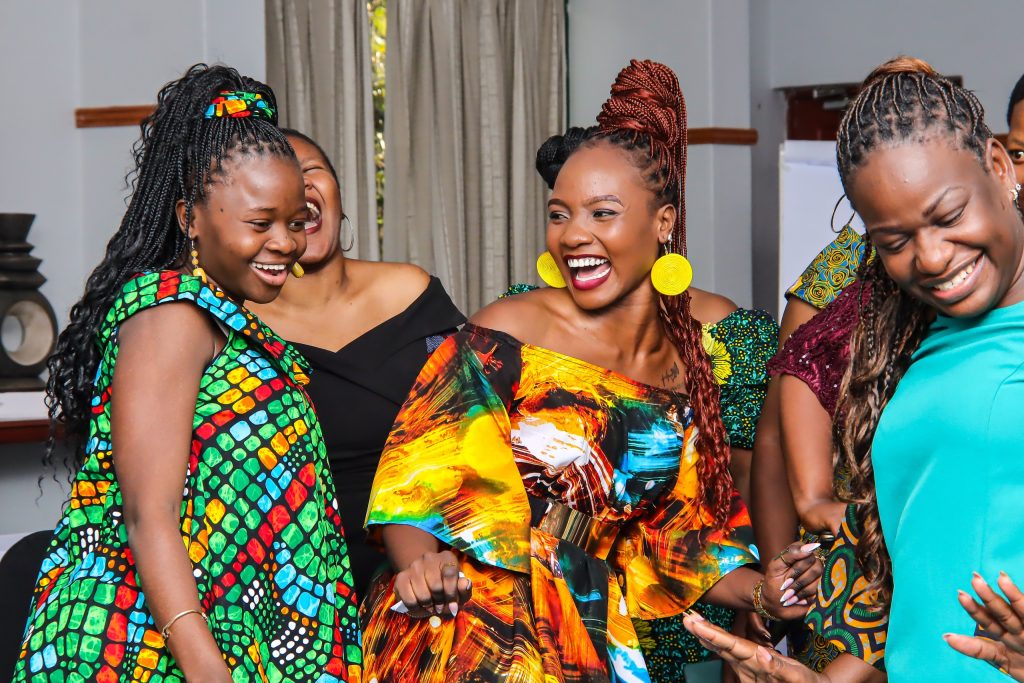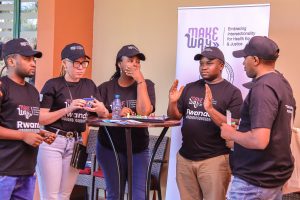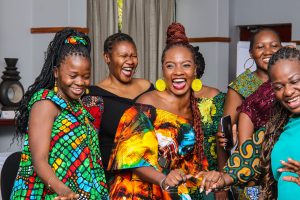Two Years of Make Way’s Regional Council of Youth with Disabilities: the young people reclaiming their voice and influence in SRHR policy OR
 11 December 2024
11 December 2024

In 2022, Make Way partner Liliane Fonds formed the first ever ‘Regional Council of Youth with Disabilities’ – to be implemented in collaboration with other partner organisations. The initiative which aligns with the Make Way programme’s intersectional approach to SRHR youth-led advocacy, is made up of fifteen (15) youth across Ethiopia, Kenya, Zambia, Rwanda and Uganda.
I spoke to members of the Council; and Make Way and Liliane Fonds partners whose vision has morphed into a group of young leaders with a disability, who are working towards influencing policy decisions on Sexual and Reproductive Health and Rights (SRHR).
Gloria Babirye from Uganda speaks of the team’s solidarity, intimating that they even gave care rituals like checking in and virtual hugs to those who might be going through difficult times. She says she’s greatly inspired by their leadership abilities too.
“My favorite thing about the monthly meetings is the rotation of meeting chairs each month. I love to see members prepare their sessions with a lot of energy.” ~ Gloria Babirye, member of the Regional Council of Youth with Disabilities
Once a month, the Council holds meetings in which they update each other on their activities, deliberate on meaningful participation in advocacy towards addressing the unique SRHR challenges of youth with disabilities. Rotation of meeting chairpersons at each meeting ensures equal participation for all members, as well as consideration of diverse perspectives. For Babirye, the rotation has revealed a great potential for leadership – her own, and that of her peers.
Make Way programme’s advocacy takes on an intersectional approach to SRHR for youth with compounded vulnerabilities. This includes examining and acknowledging that specific vulnerabilities resulting from systems and structures require equally tailored solutions. As Program Coordinator at Liliane Fonds, Géke Appeldoorn explains: “It is crucial to realise that persons with disabilities is not a homogeneous group. Besides living with a disability, they could be young, be a girl/woman or sexual minority, or LGBTQI, or be uneducated.”
In enrolling and facilitating youth with compounded vulnerabilities to be at the forefront of SRHR advocacy, Make Way supports them in reclaiming their power to influence policy decisions through peer-to-peer learning.
Taking stock
This October, implementation partners held a follow up workshop in Zambia. The event brought together youth with different disabilities and programs managers from the countries part of Make Way’s implementation, fostering meaningful participation and empowering young advocates to shape inclusive SRHR initiatives. Together, they reflected on progress, as they sought to share knowledge, and develop sustainability practices for the Regional Council of Youth with Disabilities.

Inspiration workshop Make Way
According to Patience Kanguma, the Program Manager at Cheshire Homes Society in Zambia, several partner organisations in the country have since made disability-inclusive adjustments to their physical environment, programming and internal policies. She attributes this to an increase in knowledge of disabilities and intersectional approaches thereto.
“We have also noticed that engagements with neighbourhood health committees and other community members have yielded more visibility for youth with disabilities, and in turn encouraged their interest in seeking SRH services,” Kanguma adds.
In Zambia, Council members’ research report on access to SRHR for adolescents and youths with disabilities has been disseminated to various stakeholders including some Members of Parliament, the Ministry of Health and Community Development, Zambia Agency of Persons with Disabilities and Civil Society Organisations. This is certainly a crucial first step to influencing policy.

Inspiration Workshop Make Way
Hopes for the future
For the Council’s future, another member, Eric Ngabonziza from Rwanda hopes that their advocacy efforts will drive tangible policy changes that prioritize the needs of youth with disabilities, and foster disability-inclusive communities. “That would be a great achievement”, he reflects.
“I hope for a future where our council is an established voice in regional policy discussions, influencing inclusive SRHR frameworks across different levels.” ~ Eric Ngabonziza, Regional Council of Youth with Disabilities member.
For now, Eric who has “witnessed the power of collective action” says he has gained an in-depth understanding of the Make Way Intersectional Community Scorecard (ISCS) tool and is learning to use evidence-based data to identify the SRHR challenges and barriers to youth with disabilities. With this information, the Council in better equipped to advance their advocacy efforts.
He is inspired by his peers’ collective strive for greater inclusivity and understanding. As he affirms: “Knowing that others share similar goals has been motivating and inspiring, fueling my dedication to advocate for meaningful change.”
Together with its partners like Liliane Fonds and Cheshire Homes Society Zambia, key to the Make Way programme’s mission is to ensure that youth with disabilities deepen their understanding, and take charge of applying intersectionality within their movement. Two years since it was formed, this initiative is proof that the goal is well within reach.



